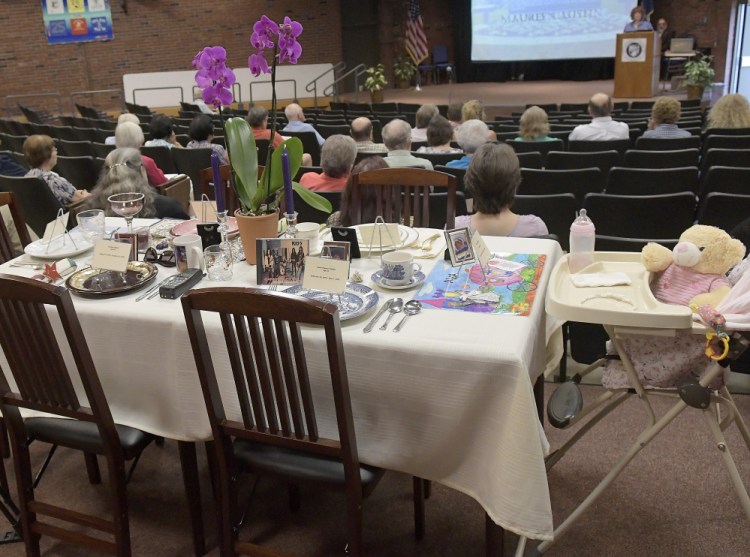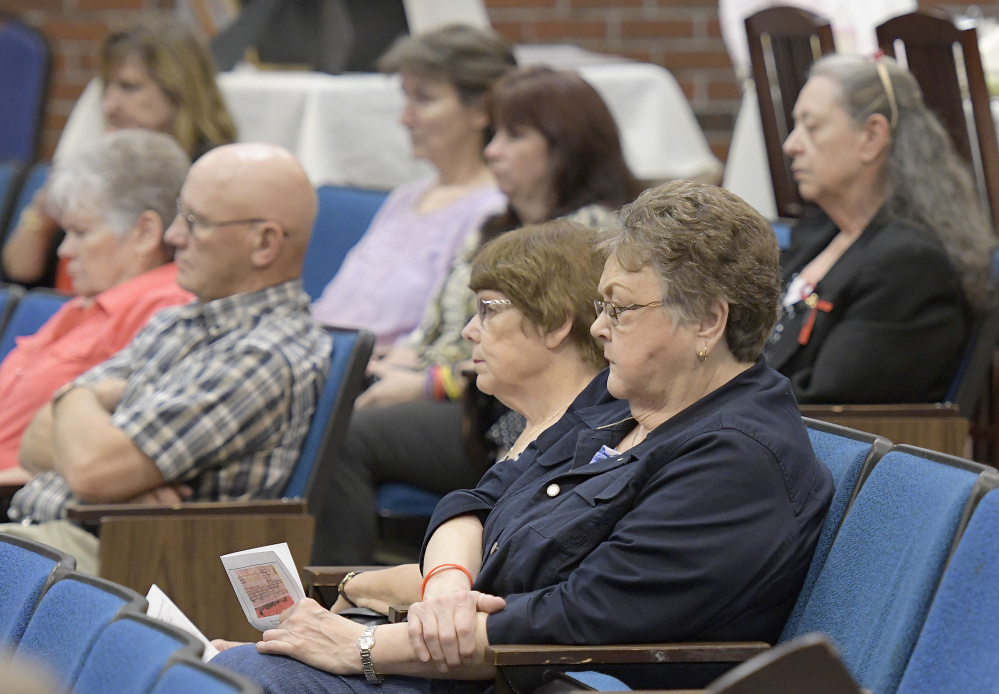AUGUSTA — Frank Johnson looked around the room and said he saw no hate, only love. He looked in the eyes of the head of the Maine State Police and said he saw nothing but compassion.
Johnson’s grandson, George Bradford Woodbury III, 32, was killed last year during an altercation at cabins near Beaver Cove. Johnson said remembering the victim and not hating the perpetrator has been part of the grieving process.
“Everybody’s different because these things have happened under different circumstances,” Johnson said following a memorial event for murder victims at the University of Maine at Augusta. “To me, part of the healing process is somehow coming to forgiveness, but that’s very hard for a lot of people and they never heal.”
Johnson and members of his family were among the nearly 50 people at the 10th annual Maine Day of Remembrance for Murder Victims event in Jewett Auditorium at UMA. The hour-long memorial service included guest speakers, music, a memorial table and a display called “Empty Place at The Table,” in honor of those whose lives were taken by another.
In Woodbury’s case, the perpetrator, Johnson said, remained at the scene until police arrived, but there were no other witnesses to the altercation, although a police affidavit states a woman was also at the scene. The medical examiner ruled that Woodbury died of asphyxiation and the manner of death was homicide. No arrests were ever made and no charges were filed. That has made the healing process extremely difficult, Johnson said, especially for Woodbury’s mother, Connie.
“It’s not good, because we know what happened,” Johnson said.
Arthur Jette leads the Maine Chapter of Parents of Murdered Children, which held its 13th annual National Crime Victims’ Rights Week observance in April. His 21-month-old grandson, Treven Cunningham, was murdered in Dexter in 1999 along with one of his mother’s closest friends, Mindy Gould, 20, who was babysitting the boy. Their killer, Jeffrey Cookson, was sentenced to consecutive life terms after being found guilty of the crimes.
“People expect like any other death that you’re going to get back to normal, but for whatever reason there is no normal, so you have to find a new one,” Jette said before the ceremony began. “We want these people to speak openly about the memories they have so the memories don’t become lost.”
While Jette, and others including Col. Robert Williams of the Maine State Police, spoke, a slideshow displayed 579 names of Maine-connected murder victims compiled using information from the last few decades, Jette said.
The first thing Williams said, as people in the audience wiped away tears, was that he had not prepared any remarks.
“I have no idea what you’ve been through or what you go through every day,” he said. “I hope I never have to.”
He spoke about the dedication of the detectives and troopers who investigate murders in Maine, including the 13 that have happened so far in 2017. He talked about the new unsolved murder, or cold case, squad that has a daunting task ahead of them because “everyone wants their case to be at the top.” But mostly, he just offered support.
“You need to have someone that calls and says ‘hey, how you doing?'” he said. “So today that’s me.”
The national Parents of Murdered Children organization was founded by Robert and Charlotte Hullinger, of Cincinnati, in 1978 following the murder of their daughter while she was studying in Germany. The event has been held each Sept. 25 — the day Lisa Hullinger was murdered — since Congress designated the National Day of Remembrance for Murder Victims 10 years ago.
The Maine chapter of Parents of Murdered Children has provided support services for surviving family members of murder victims, as well as murder-prevention programs, for 27 years. The group also maintains the Maine Murder Victims’ Memorial Monument located in Holy Family Cemetery on Townsend Road in Augusta, adding names at an annual re-dedication each June.
At the back of the auditorium an empty table with place settings donated by family members of murder victims was set up by the New Hope for Women, a domestic violence advocacy group that serves Sagadahoc, Lincoln, Knox and Waldo counties. Lisa Couture, an educator in the organization, spoke for several minutes and said that in the time she talked another woman had been battered.
Domestic violence murders are more prominent in Maine than any other type of homicide, Jette said. He ended his remarks by saying that despite appearing to be such a safe and peaceful and beautiful place, it’s safer in Maine to be on the streets than in your own home.
Jason Pafundi — 621-5663
Twitter: @jasonpafundiKJ
Send questions/comments to the editors.






Comments are no longer available on this story